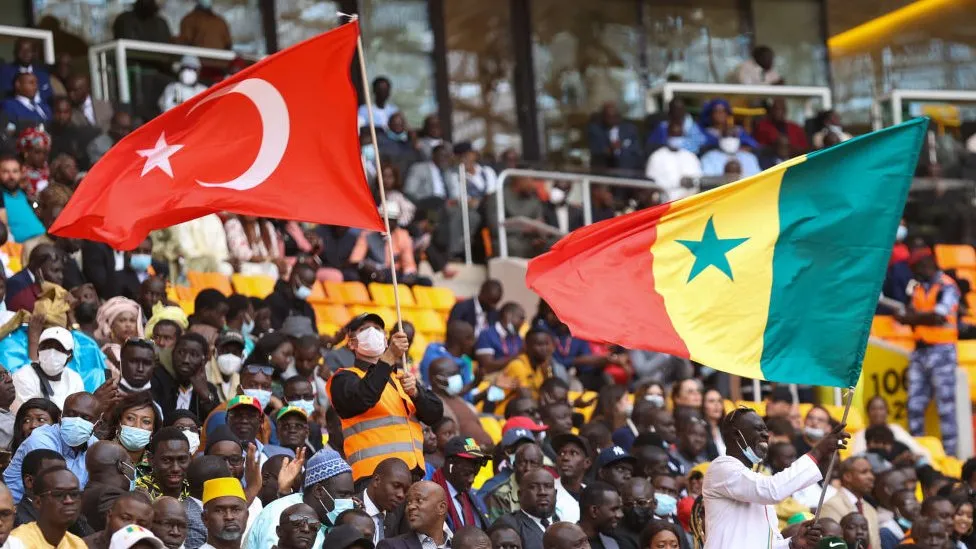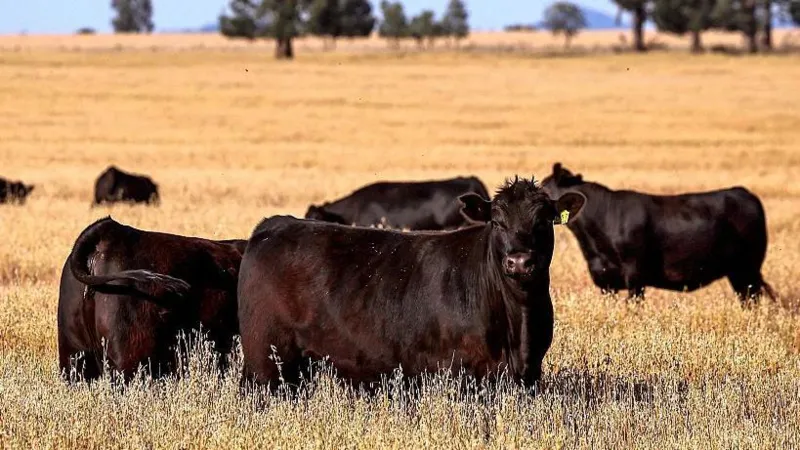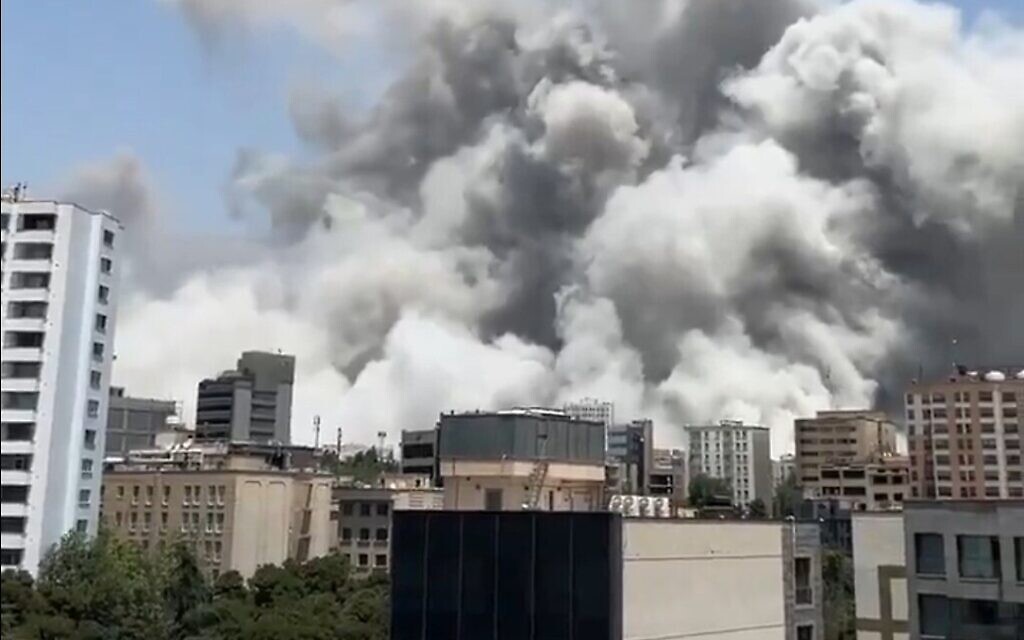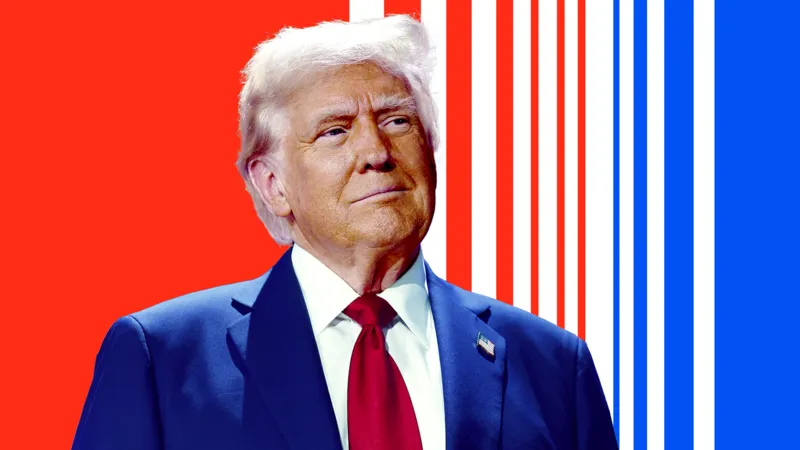Why Turkey's election is being closely followed in Africa
Turkey's influence in Africa has been growing massively over the past 20 years and whoever wins Sunday's presidential run-off will have to consider where next to take the relationship.

Ever since Recep Tayyip Erdogan took power in Turkey two decades ago, first as prime minister then as president, he has taken an increasing interest in Africa.
He saw economic, military and diplomatic opportunities.
The bond between Ankara and the continent is likely to only get stronger if the president is re-elected.
His rival, Republican People's Party leader Kemal Kilicdaroglu, has his eyes set on Europe and the West and is less likely to make Africa a priority.
"Mr Kilicdaroglu stressed the need for recalibrating relations with the West and said he will try to revive the accession process to the European Union," says Serkan Demirtas, Ankara bureau chief for Hurriyet Daily News and a Turkish foreign policy expert.
"In an interview, he even said that a 180-degree turn is to be expected when it comes to foreign policy. But he fell short of detailing how these changes will impact the relations with key countries in the world."
However, Ece Goksedef from the BBC's Turkish service points out that Turkey's foreign policy towards the continent would take some time to recalibrate, so it is unlikely it will change that drastically given the strong foundation of this new relationship.
When did Turkey-Africa relations take off?
The seeds for the enhanced co-operation between Africa and Turkey were planted during Mr Erdogan's stint as prime minister, which began in 2003.
Mr Erdogan saw a potential economic boon.
"In the early 2000s, the Turkish economy witnessed continued growth and was looking for new markets," says foreign policy expert Mr Demirtas.
"A diverse market with more than 50 countries and more than 1.2 billion people offers lucrative opportunities for Turkish exporters and businessmen."
Turkey's annual trade with the continent increased from $5.4bn (£4.4bn) to $34.5bn between 2003 and 2021, according to figures from the Turkish foreign ministry, led by chemicals, steel and cereals.
The Turks were keen to stress that this was not an exploitative relationship and in 2013, then Prime Minister Erdogan said on a visit to Gabon that "Africa belongs to Africans, we are not here for your gold".
After proving its worth in Libya, Armenia and Ukraine, the Bayraktar TB-2 drone is now being presented as the perfect weapon to target the mobile and nimble jihadist groups hiding in West Africa's Sahel region.
Why African countries are buying Turkish drones
This March, a dozen of the drones arrived on the tarmac of the airport in Mali's capital, Bamako.
In the presence of Malian junta leader Col Assimi Goïta and a handful of Turkish diplomats, Mali's defence minister welcomed the new batch of the weapons saying that they "can help make artillery and air strikes more accurate".
In addition to Mali, Turkey has sold drones to Burkina Faso, Togo and Niger - the four Sahelian nations are desperate to combat the rise of Islamist militants in the region.
Turkey has also engaged in talks with Benin, which until recently was untouched by the Islamist insurgency but is now witnessing a rise in attacks and intrusions on its territory.
Morocco, Tunisia, Ethiopia, Nigeria and Somalia are also all known customers of the Turkish-manufactured armed drones.
While China still dominates this market on the continent, Turkey offers a more affordable option with a shorter waiting list.
Turkey also offers other military hardware.
Armoured and mine-clearance vehicles, sensor and surveillance systems and rifles have also been part of the many arms deals Turkey has recently signed with African countries.
In total, 30 states on the continent have some sort of security-related agreement with Turkey - 21 of them were ratified in 2017 - according to a report by the German Institute for International and Security Affairs.
Turkey has built a military base in Somalia's capital, Mogadishu, and is involved in the training of more than 20,000 Somali special forces.
As well as being fully invested in counter-terrorism initiatives, Ankara has also increased its humanitarian aid to countries like Nigeria, Mauritania, and Niger.
How has diplomacy shifted?
Outside the military and trade deals, Mr Erdogan has been very active cementing the Turkey-Africa relationship.
In 2005, Turkey became an observer member of the African Union before being elevated to the role of strategic partner three years later.
President Erdogan has visited Senegal four times - as often as he has been to China or Germany.
And where he goes, a business delegation goes with him, resulting in key infrastructure projects being awarded to Turkish companies, like the Dakar Olympic swimming pool or the Kigali Arena in Rwanda, East Africa's biggest stadium.
More recently, Uganda has terminated its contract with a Chinese firm in charge of building a railway to the Kenyan border and is considering a deal with a Turkish company instead.
Turkey-Africa summits have always been well-attended by continental heads of state .
Perhaps the most telling fact is the number of Turkish embassies on the continent. It has 44 across Africa - similar to the US with 49 and France, 46, although some way behind China's 53.
What else is Turkey offering Africa?
Turkey has also tried to increase its soft power on the continent.
The recent expansion of its footprint is undoubtedly the launch of TRT Afrika.
Turkey's public broadcaster TRT banked on the withdrawal of several competitors in the region to launch this digital news platform in French, English, Swahili and Hausa.
But perhaps the biggest cultural impact comes from Turkish soap operas, which have become huge hits in several African countries - from Ethiopia to Senegal.
Turkey is also involved in charitable work in different countries, spearheaded by Tika, the Turkish Cooperation and Coordination Agency, which funds schools, religious institutions and medical facilities.
In Somalia, Mr Erdogan enjoys popular backing because of the support he has given the country. Under his rule, Turkey's government built one of the biggest hospitals in Mogadishu, which was named after him.
There are also Turkish-built hospitals in Libya and South Sudan.
A less-well known aspect of the relationship with Africa is energy.
Off the back of presidential visits, Turkish company, Karpowership, has signed deals for its ship-mounted power plants to supply electricity to several West African countries, and last week South Africa. These are moored off the coast and directly plugged into the national grid, supply between 30 MW and 470 MW per vessel.
If Erdogan wins, he is expected to build on this relationship. A victory for Kilicdaroglu might push Africa down the priority list but he is unlikely to do anything to jeopardise such deep and lucrative ties.
-bbc







